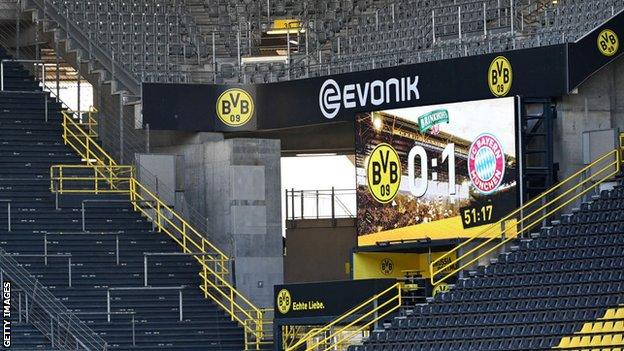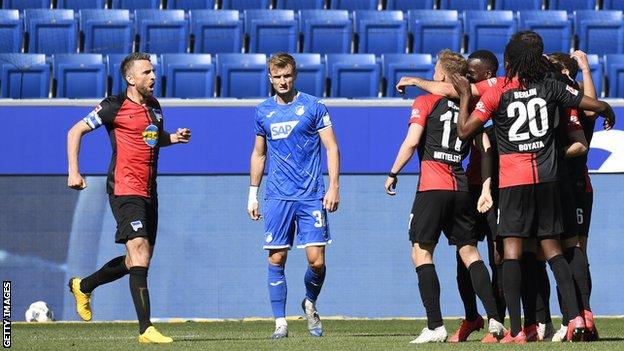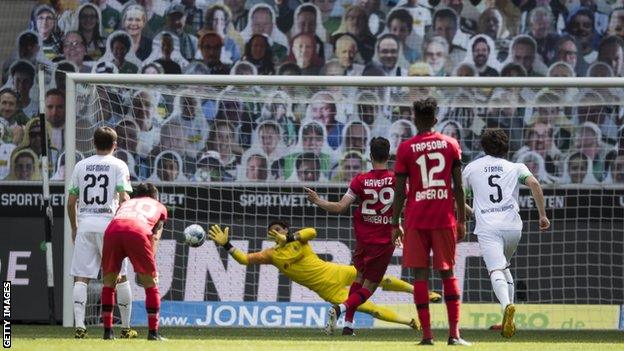Bundesliga: How successful has the league's return been?
- Published

Bayern Munich beat Borussia Dortmund behind closed doors to move seven points clear at the top of the Bundesliga on Tuesday
With the rest of Europe's top leagues on hiatus, the Bundesliga is the centre of attention in the world of football.
Despite some criticism from fans and politicians, the return of the league has been a major success for clubs and broadcasters.
After the Bundesliga made its decision to return to action and got the go-ahead from the authorities, the league was under fire from politicians, journalists and fans for weeks.
A survey by research institute Infratest dimap, carried out on behalf of broadcaster DW in late April, revealed 49% of Germans were against the continuation of the season.
The fear was that players and staff would get infected and that the Bundesliga could potentially contribute to a second wave of the coronavirus pandemic. "The hygiene concept does not work. The effect will be disastrous," predicted Karl Lauterbach, a health expert representing the Social Democrats in Germany's national parliament.
But, so far, all fears have been proven wrong. Almost all Covid-19 tests from players and staff have come back negative. Dynamo Dresden have been the only team from the Bundesliga or Bundesliga 2 who had to quarantine because of multiple infections.
The German Football League (DFL), which is responsible for operating the two divisions, did not panic about the situation in Dresden. "I don't see it as a setback, because we expected that something like this could happen," chief executive Christian Seifert said. "We still have a buffer to stage more matches in the next couple of weeks."
Controversial goal celebrations

Hertha Berlin players broke social distancing rules when they celebrated their goals in the win over Hoffenheim on their return to action
The only controversy the DFL had to deal with, early after the restart, occurred when some teams started ignoring physical distancing rules.
The league's hygiene protocol recommends physical distancing as much as possible when the ball is not rolling. That has made for some awkward moments when players, seconds after they had close body-to-body contact with their opponents, were asked to stay apart from each other and only tap elbows to celebrate a goal.
Hertha Berlin were the first team to throw caution out the window when, on the first matchday after the break, they celebrated their goals against Hoffenheim with hugging, high fiving, and shoulder tapping, causing concern among political decision-makers about how disciplined the players could be.
"I didn't like that. You know that many things related to football have engendered criticism," commented Markus Soder, state premier of Bavaria. Soder was among the early supporters of the Bundesliga restart, but he knew that pictures of hugging players could backfire.
If a player tests positive for Covid-19, the local health authorities will decide whether only the player or the entire team has to quarantine. They look at evidence such as video footage to figure out how much close face-to-face contact others had with the infected individual.
Other teams have celebrated just as exuberantly. As comprehensive as the hygiene protocol is, instinct tells players that once they are on the field things are as they were before the pandemic.
"You can't hide your emotions," said goalscorer Vedad Ibisevic after Hertha's match against Hoffenheim. "I asked our doctor before the game whether the goal counts if we do that. That was the most important thing to me. We are passionate footballers and not robots."
Practice-like atmosphere
The actual football has not changed much. Following a slow start with several muscle injuries, the tempo and fitness levels have visibly increased to a level close to what they were in February and March.
Without crowds, home advantage has been eliminated while the actual playing time is higher than in matches with crowds because of shorter interruptions. Players do not perform for the audience, approaching the games more like practice matches with fewer theatrics.
The lack of crowds also affects how much risk players take. "It is a chance for the training champions," Bayern Munich legend Franz Beckenbauer said. He believes those who normally shine in practice and then falter under the pressure of competitive matches can come into their own in this environment.

Bayer Levurkusen's Kai Havertz scores from the penalty spot in front of Borussia Monchengladbach's cardboard cut-out fans
During the first three matchdays, there were more stepovers and back-heel flicks but also more backward passes to goalkeepers than usual.
"It is now important the players push themselves," Bayern's head coach Hansi Flick said last weekend. "The bench can also have a positive impact and motivate them." He and his colleagues have the advantage that their instructions can be heard right across the pitch.
Some leaders on the field have also benefited from the silence, allowing them to communicate with team-mates more clearly. "If you play in front of 81,000 fans, you have no chance to give instructions to the midfielders," Borussia Dortmund goalkeeper Roman Burki said. "Now, Mats Hummels as our chief defender or I can sometimes conduct the midfield. Or we warn team-mates when they have an opponent behind them."
Record-breaking television ratings
While the experience for television viewers might not be perfect, the ratings for Sky Germany, the main television rights-holder, have been record-breaking, with over six million tuning in to watch the first few matches after the break on 16 May, a market share of over 60% among 14 to 49-year-olds. A week later, with the novelty gone, a still-impressive three million were watching the Saturday games.
The numbers could be regarded as outliers because a portion of the matches were available on Sky's free TV and not only on their subscription channels. But the restart has paid off for the company, which continues to adjust the broadcasts, experimenting with artificial crowd noises to combat the silence.
Everyone from the club officials to the television directors knows that the current situation can only be temporary because crowds are one of the Bundesliga's biggest assets. So far, fans have been split on how to treat this "ghost games" era.
While the television ratings indicate that many are happy to watch football even without stadium atmosphere, active fan groups have been very vocal about their disdain for the decision to continue.
Banners criticising the "greed" of the Bundesliga's power brokers have been seen across the country. Clubs asked supporter groups to send them their banners and flags before home games, and most clubs even put the ones with critical messages inside the stadiums to give their fans a platform.
Supporters of FC Cologne protested more creatively by placing a couch outside the RheinEnergieStadion, writing: "Stadiums instead of couches." Their criticism will probably not fall on deaf ears. "If you stage matches without crowds, some may realise how important fans are inside the stadiums," Cologne manager Horst Heldt said recently.
But he agrees with the other managers and chief executives in the Bundesliga that the season should be completed as scheduled because the clubs have done a remarkable job and made the best out of a difficult situation so far.